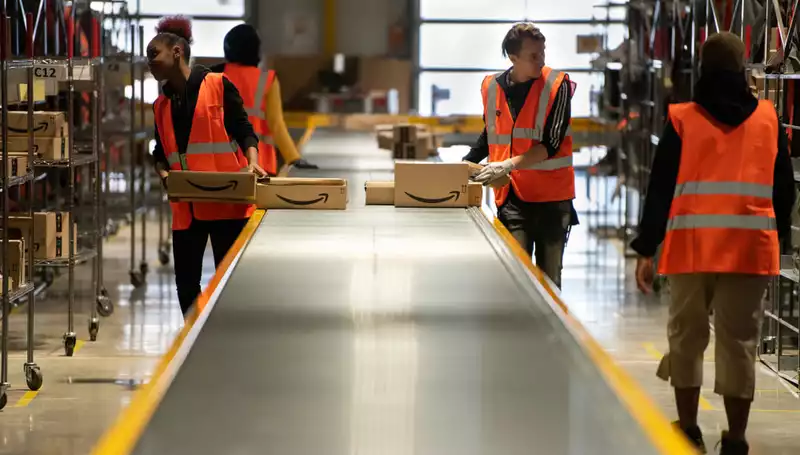Updated with comments from Amazon.
Amazon may be delivering coronavirus to your home.
This comes from employees at Amazon warehouses in Europe and the US, who told The Washington Post earlier this week that Amazon is sending home only those who have started coughing, and that the company's measures to sanitize its warehouses are "totally inadequate." [Yesterday (March 18), a worker at Amazon's sorting facility in Woodside, Queens, NY, tested positive for COVID-19. Amazon spokeswoman Lena Lunak told The Atlantic that all workers were sent home with full pay.
This is the first reported case of a U.S. Amazon worker contracting the disease, but there have already been other cases in Spain and Italy, where warehouses continued to operate after workers tested positive.
Because studies have shown that coronaviruses can survive on cardboard for up to 24 hours, it may be best to leave Amazon packages unopened for a day or two after they arrive home. Coronaviruses can survive on plastic and stainless steel for up to three days.
Closing warehouses altogether would cripple Amazon's delivery system, even as demand surges at a time when the coronavirus crisis is forcing millions of people to stay home. Just a few days ago, Amazon announced in a blog post that it would temporarily prioritize shipments of basic household and medical supplies over other products.
On Tuesday (March 17), a New York area Amazon workers' organization called Amazonians United NYC demanded that all warehouse workers get paid sick leave, childcare subsidies, and hazard pay.
Currently, only workers who test positive for the coronavirus are eligible for paid sick leave.
Amazon said in an online petition signed by more than 1,500 Amazon employees worldwide that "we need a comprehensive plan to ensure the safety of all workers and more."
Amazon told The Atlantic that the Queens sorting facility was "temporarily closed for additional sanitation," but Luismi Ruiz, an Amazon warehouse worker in Spain, told The Washington Post that two employees tested COVID-19 tested positive for COVID-19 and said his facility is still open, despite the fact that other employees have been quarantined.
"It's an atmosphere of fear right now - great fear," Ruiz told The Post.
In response, Amazon told the Post that warehouse workers are given ample breaks to wash their hands. However, New York warehouse worker Jonathan Bailey disputed this, saying that restrooms are often a long walk from the pull station and that enforcing sanitation would risk workers failing to meet their quotas and being written up by their supervisors.
"If workers have to cough or sneeze, they will not develop good hygiene habits." It affects the incarceration rate."
To meet the huge demand for home delivery orders spurred by the coronavirus crisis, Amazon announced Monday that it will hire 100,000 new workers in the United States and raise hourly wages in the US and Europe. Some European warehouse workers were concerned that the increased headcount would only increase the risk of spreading the coronavirus in Amazon's warehouses.
However, Dale Rogers, a professor of supply chain management at Arizona State University, told The Atlantic that it may not be the worst-case scenario.
If Amazon delivery drivers start testing positive, "it could be a disaster," Rogers said.
Amazon took notice of our article and sent us the following statement, along with a link to a company blog post outlining Amazon's coronavirus-related policies.
"We support individuals who are currently in quarantine. From the outset of the incident, we have responded proactively by working closely with local authorities to ensure that we continue to serve our customers with due consideration for our employees and follow all local authority guidelines for the operation of our buildings.
We have implemented proactive measures to protect our employees, including enhanced cleaning of all facilities, maintaining social distancing, and keeping distance between drivers and customers during deliveries Based on guidance from the CDC, World Health Organization, and Surgeon General, we currently have no evidence that COVID-19 is There is no evidence that it is spreading through luggage.
In addition to intensified daily thorough cleaning, we temporarily closed our Queens delivery station for further sanitation and sent employees home with full pay.
.









Comments